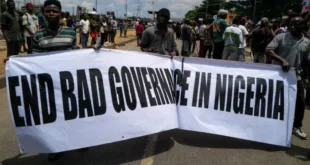Yes, the crash of the price of corn is now a conversational currency celebrated in high -level meetings, amplified by the titles and defended in political briefs. For many, it represents a quick victory for consumers who fight food inflation. But for those of us who have followed the lived realities of small farmers throughout the country, it seems more an insult than a solution. Among the farmers, perhaps there is no policy as a paralyzing as the recurring decision of the government to flood the import market under the remains of price control. He is Draconian.
It is not just a economic blow; It is emotional. The Middle Nigerian farmer, already working under the weight of poor infrastructure, irregular climate and growing insecurity, is now forced to accept peanuts for months of back-roking work. While the season of the 2025 plantations is well started, many farmers have spoken to complain about the same frustrations: to resize the demand for their products and stars input costs. It is difficult not to feel their despair because it is not just corn; These are dignity of work.
I remember when the fertilizer was a stranger
I still remember that the first time that the fertilizer became a conversation among the farmers of my community. It was strange and unknown, almost intrusive. We were used to composting with animal dung and cooking waste. For years, it has been enough.
The fertilizer, then, was chasing the farmer. Today, that equation has been completely turned upside down. With the swollen population and the reduction of agricultural land, the pressure to increase the yield has never been greater than now. It is the farmer who desperately chases the fertilizer.
But chasing does not mean capturing. In many parts of the north it is. , Basic urea fertilizers and NPK are now evaluated out of reach and continue to increase day by day. What started the season at ₦ 37.000 and ₦ 43,000, respectively, is now ₦ 48,000 and ₦ 65,000 in a few months. To put it in a painful context: the amount that a farmer earns from the sale of a bag of corn today can just buy a lot of fertilizers. This is the absurd economy we have created.
The policy of the inputs
Even worse is how much the distribution of essential inputs has become politicized. In too many places, access to the fertilizer is a privilege granted on the basis of the fade and loyalty of the party. Power party members are favored, while those outside the circle are left behind. How do we expect to build a resilient agricultural sector when our policies are so deeply colored by political patronage?
It is a bitter pill for many farmers who simply want a right shot, nothing more. They are not asking for dissemination; They are asking for a qualifying environment. One in which the sweat on their forehead translates into real value on the market, not disappointment.
When rice also loses its value
And it’s not just corn. Rice growers and local transformers have also been left. I first saw the warehouses full of invented and screwed rice. Some of these processors have taken loans, invested in modern equipment and have hired workers all in line with the previous call of the government to increase the local capacity. Now, they are blocked with tons of products that cannot sell, all because the government has decided to stop prices by approving more imports. They are celebrating!
This type of U -wing policy has not only damaged businesses. It breaks the trust. It is no wonder that trust in the system is eroding, especially among the young people who once saw agriculture as a practicable career.
The way to follow
We must be honest with ourselves. Crasciare the price of corn through import might seem like an easy solution, but it is short -sighted. It is time to rethink our approach, one who gives priority to local production, not to undermine it. We need a clear political framework that guarantees fair prices for farmers, they guarantee access to quality inputs at convenient rates and support services to decompose.
Extension services must be strengthened to guide farmers on the best practices. Rural roads and storage infrastructure must be improved to reduce post-cacculted losses. Above all, there must be a national price stabilization mechanism that protects the farmer from market shocks.
Conclusion
Agriculture should not be a punishment for those who choose to feed the nation. The farmer who cultivates the corn under the sun should not be the poorest in the food chain. We owe it to our farmers to ensure that their efforts are not in vain. Until we put the small farmer at the center of our agricultural agenda, the dream of food security will remain a dream and will allow those who meet our leaders to bring people’s hopes with them and return with something that makes the day brilliant.
 JamzNG Latest News, Gist, Entertainment in Nigeria
JamzNG Latest News, Gist, Entertainment in Nigeria









